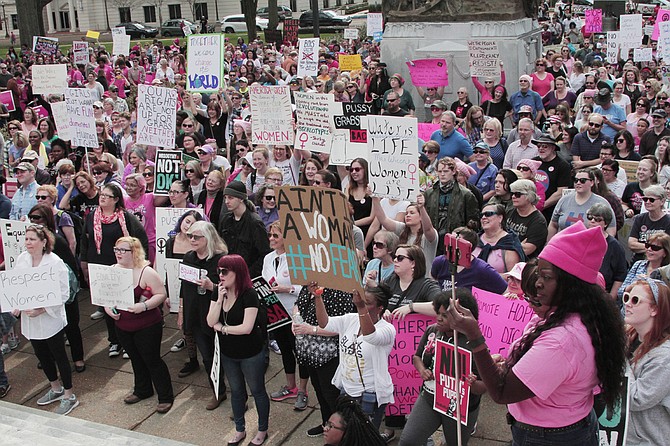Hundreds of women, men and children marched in downtown Jackson on Saturday, Jan. 21, in a sister march to the Women's March on Washington, D.C., to advocate for women's rights. Photo by Arielle Dreher.
JACKSON — Hundreds of women, men and children protested in downtown Jackson on Saturday in a sister event to the Women's March on Washington, D.C., in support of women's rights. The D.C. march released its guiding principle: that women's rights are human rights "regardless of a woman's race, ethnicity, religion, immigration status, sexual identity, gender expression, economic status, age or disability."
Several women from a vast array of fields spoke to the crowd advocating for equal pay, immigrants' rights, LGBT equality, Black Lives Matter, disability rights, abortion rights, Planned Parenthood, and the need for a free, independent press.
Rep. Alyce Clarke, D-Jackson, called on more women to run for public office, and start talking about politics more in social circles and public spaces. "If we get enough women in the right places, we'll start getting paid the right amount," Clarke told the crowd.
Patricia Ice, director of the legal project at the Mississippi Immigrants Rights Alliance in Mississippi, told the crowd that immigrants' rights are human rights, too.
"I want you to remember the immigrant women," Ice said at the Capitol on Jan. 21. "I want the administration to support the immigrant women, and I want immigrant to women to have the same economic privileges as American men and women have and the same educational opportunities."
Hattiesburg pastor Brandiilyne Mangum-Dear, a plaintiff in the case that struck down House Bill 1523, told the crowd that legislation like HB 1523, which would have allowed Mississippians to refuse serve members of the LGBT community due to their sincerely held religious beliefs, is an important reason to protest.
"As we enter into the next four years, it is vital that we rally; it is vital that we protest; it is vital that we march, we have to continue to fight legislation and policies that encourage this behavior," she said. "But I challenge you to not only show up to the marches and in the courtrooms and at the rallies, but to speak up in the every day."
Kristy Johnson, Miss Black Mississippi USA, called on the teenage and college-aged marchers to continue to fight for their rights, recalling the tradition of Ida B. Wells and Fannie Lou Hamer, who were both born in Mississippi.
"Our rights are important no matter what color you are, no matter who you date, no matter what religion you are ... all of you are here for a reason and a purpose, and to me, it's so important that you are here," Johnson said.
Felicia Brown-Williams, the director of public policy at Planned Parenthood Southeast, told the crowd that the Women's March scheduled in Hattiesburg, where the state's only Planned Parenthood clinic is, was canceled due to the deadly tornado that hit the city the night before. Marchers were instead helping with recovery, while other marches happened in Gulfport, Jackson and Oxford.
Brown-Williams said Planned Parenthood has offered birth control, cancer screenings, sex education and sexually transmitted infection testing and treatment for 100 years. She discussed the Congress' attempt to defund Planned Parenthood, a move that the Mississippi Legislature tried last session before a U.S. district judge struck it down.
"Who's going to be hurt most by this?" Brown-Williams said. "Women: folks who are already facing all kinds of barriers to care, folks who are low-income, folks of color, rural folks and people like me when I first came to Planned Parenthood 14 years ago. ... I never had an abortion because of Planned Parenthood."
Jackson Free Press editor-in-chief and CEO Donna Ladd spoke at the end of the protest about the need for a free and independent press that rejects "access journalism." She pointed out the dearth of women in media leadership in Mississippi. "I can probably count on one hand the number of women in newsroom management in the State of Mississippi," she said.
The Women's March website estimates more than 600 sister marches happened Saturday worldwide, with 4.8 million marchers. Crowd scientists told The New York Times that about 470,000 people marched in Washington Saturday.
Email state reporter Arielle Dreher at [email protected] and follow her on Twitter @arielle_amara.


